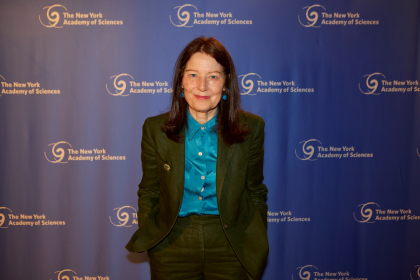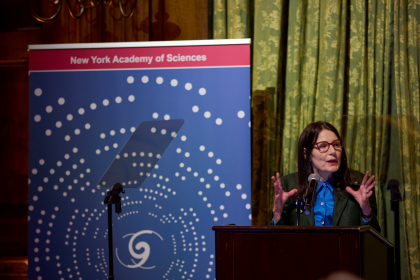Janet Tobias Recognized for Advancing Science Comms
Janet Tobias, winner of an Emmy and Peabody Award, was one of four Honorees recently recognized by The New York Academy of Sciences (the Academy) for outstanding contributions to science.
Published May 5, 2025
By Nick Fetty

Tobias, well-respected by her colleagues for her curiosity, tenacity, and passion for educating audiences about science, was presented with the 2025 Communicating Science Award during the Academy’s recent Spring Soirée, hosted at the University Club of New York.
“[Janet is] driven by [her] mission of demystifying science to help audiences understand how it shapes the world,” said Amy Entelis, Executive Vice President of Talent, CNN Originals, and Creative Development at CNN Worldwide, during the award ceremony at the Soirée. “We are living in a time of heightened scrutiny and antagonism towards science, and the work that [Janet does] to increase trust is important now more than ever.”
Tobias’s production career started at CBS where she served as an associate producer for 60 Minutes. She then had stints at NBC, ABC, and PBS, before making her theatrical debut with the 2012 release of No Place on Earth. The documentary, which debuted at the Toronto International Film Festival, was called a “substantial contribution to Holocaust cinema” by Variety.
A Strong Journalistic Sense
With a strong journalistic sense of storytelling across a range of issues, much of her work has focused on medicine and health. Her 2017 documentary, Unseen Enemy, explored “the 21st-century threat of pandemics” prior to the outbreak of COVID-19. It went on to be broadcast on five continents in nine languages. She was nominated for Writers Guild Awards for her work on both Unseen Enemy and No Place on Earth.
Memory Games, released in 2018, “offers a thrilling insight into the lives of four athletes…as they compete for the title of World Memory Champion.” Her most recent work, Fauci, a National Geographic Documentary Film, profiled Anthony S. Fauci, MD, the world renowned infectious disease specialist. His work on everything from HIV/AIDS and SARS to Ebola and COVID-19 has saved millions of lives, though he and his family have still been subject to threats from often anonymous adversaries. The film was produced in collaboration with National Geographic and was nominated for three Critics Choice Awards.
An Entrepreneurial Streak and Commitment to Service
In addition to Tobias’s award-winning production work, she also has an effective streak as an entrepreneur. In 2000 she co-founded Sierra/Tango Productions, which has produced more than 20 documentaries. She founded Ikana Health & Media in 2004, where she “focuses on how health content, technology, and social networks affect health behavior.” Then in 2019, she co-founded the Global Health Reporting Center, a nonprofit “dedicated to covering the key health issues of our time.”

She has previously served on advisory boards for the East Harlem Health Outreach Partnership (the student-run free clinic of Mount Sinai), Healthbuilders, Healthright International, and The National Juvenile Defenders Center. Hailing from Indiana, with a degree in comparative literature from Yale University, Tobias has also previously served in adjunct faculty roles with NYU’s School of Global Public Health and Columbia University’s School of International and Public Affairs.
The Importance of Science Communication
With a slew of accolades to her name, Tobias was appreciative of the recognition at the Soirée, particularly as it demonstrated her role in supporting the Academy’s mission of advancing science for the public good.
“This award means a lot to me personally. I think my father would be proud. He was a research scientist and professor in organic chemistry who died of cancer at 49 years old,” Tobias said when accepting the award. “It wasn’t until I was way into adulthood that I truly fell in love with science. And now I see how wonderful it is.”
Tobias closed her remarks by stressing the importance of science communication quoting William Osler, MD, one of the founders of Johns Hopkins Hospital: “In science, credit doesn’t go to the person who had the idea first, credit goes to the person who convinces the world.”
